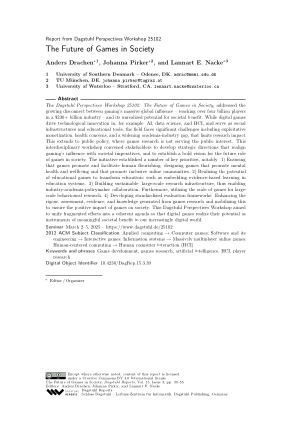The Future of Games in Society (Dagstuhl Perspectives Workshop 25102)
Authors Anders Drachen, Johanna Pirker, Lannart E. Nacke and all authors of the abstracts in this report
-
Part of:
Issue:
Dagstuhl Reports, Volume 15, Issue 3
Part of: Volume: Dagstuhl Reports, Volume 15
Part of: Journal: Dagstuhl Reports (DagRep) - License:
 Creative Commons Attribution 4.0 International license
Creative Commons Attribution 4.0 International license
- Publication Date: 2025-10-10
File

PDF
DagRep.15.3.39.pdf
- Filesize: 2.56 MB
- 17 pages
Document Identifiers
Subject Classification
ACM Subject Classification
- Applied computing → Computer games
- Software and its engineering → Interactive games
- Information systems → Massively multiplayer online games
- Human-centered computing → Human computer interaction (HCI)
Keywords
- Game development
- games research
- artificial intelligence
- HCI
- player research
Metrics
- Access Statistics
-
Total Accesses (updated on a weekly basis)
0PDF Downloads0Metadata Views
Abstract
The Dagstuhl Perspectives Workshop 25102: The Future of Games in Society, addressed the growing disconnect between gaming’s massive global influence - reaching over four billion players in a $230+ billion industry - and its unrealized potential for societal benefit. While digital games drive technological innovation in, for example, AI, data science, and HCI, and serve as social infrastructures and educational tools, the field faces significant challenges including exploitative monetization, health concerns, and a widening academia-industry gap, that limits research impact. This extends to public policy, where games research is not serving the public interest. This interdisciplinary workshop convened stakeholders to develop strategic directions that realign gaming’s influence with societal imperatives, and to establish a bold vision for the future role of games in society. The initiative established a number of key priorities, notably: 1) Ensuring that games promote and facilitate human flourishing; designing games that promote mental health and wellbeing and that promote inclusive online communities. 2) Realizing the potential of educational games to transform education; such as embedding evidence-based learning in education systems. 3) Building sustainable, large-scale research infrastructure, thus enabling industry-academia-policymaker collaboration. Furthermore, utilizing the scale of games for large-scale behavioural research. 4) Developing standardized evaluation frameworks. Enhancing the rigour, assessment, evidence, and knowledge generated from games research and mobilizing this to ensure the positive impact of games on society. This Dagstuhl Perspectives Workshop aimed to unify fragmented efforts into a coherent agenda so that digital games realize their potential as instruments of meaningful societal benefit in our increasingly digital world.
Cite As Get BibTex
Anders Drachen, Johanna Pirker, and Lannart E. Nacke. The Future of Games in Society (Dagstuhl Perspectives Workshop 25102). In Dagstuhl Reports, Volume 15, Issue 3, pp. 39-55, Schloss Dagstuhl – Leibniz-Zentrum für Informatik (2025)
https://doi.org/10.4230/DagRep.15.3.39
BibTex
@Article{drachen_et_al:DagRep.15.3.39,
author = {Drachen, Anders and Pirker, Johanna and Nacke, Lannart E.},
title = {{The Future of Games in Society (Dagstuhl Perspectives Workshop 25102)}},
pages = {39--55},
journal = {Dagstuhl Reports},
ISSN = {2192-5283},
year = {2025},
volume = {15},
number = {3},
editor = {Drachen, Anders and Pirker, Johanna and Nacke, Lannart E.},
publisher = {Schloss Dagstuhl -- Leibniz-Zentrum f{\"u}r Informatik},
address = {Dagstuhl, Germany},
URL = {https://drops.dagstuhl.de/entities/document/10.4230/DagRep.15.3.39},
URN = {urn:nbn:de:0030-drops-249011},
doi = {10.4230/DagRep.15.3.39},
annote = {Keywords: Game development, games research, artificial intelligence, HCI, player research}
}
